Vice President William Lai (賴清德), the Democratic Progressive Party’s (DPP) presidential candidate, yesterday said that if elected he would expand financial support and loosen regulations to help the nation’s innovative start-ups grow.
Lai at a news conference at DPP headquarters in Taipei pledged to develop a “start-up ecosystem” that would provide a better environment for young people to develop their businesses.
Among Lai’s goals were he to become president would be to create 20,000 jobs among start-ups in five years and turn Taiwan into a major “exporter” of innovative solutions in a decade, but he provided little detail as to how he planned to reach those goals.

Photo: Liao Chen-huei, Taipei Times
His only specific promise was to provide seed funding through the National Development Fund and other funding programs, which already seems to be happening.
The National Development Fund currently provides angel funding to start-ups, which are defined as companies that have operated for less than five years with paid-in or fundraising capital not exceeding NT$100 million (US$3.09 million).
Acquiring early-stage capital is the most challenging task for young entrepreneurs and “strategic investments” by the government would help smooth their way as they start their businesses, Lai said.
He pledged NT$150 billion to finance the program and said the government would devise various investment strategies to manage different risks involving new and emerging businesses.
In 2018, when Lai was in charge of the executive branch of government as premier, President Tsai Ing-wen (蔡英文) pledged NT$10 billion in funding from the National Development Fund to support start-ups.
Government data showed that as of September 2020, the fund had poured approximately NT$1.63 billion into 114 start-ups.
Lai also said that his administration would loosen regulations to spur start-up development and attract global marketing executives to work in Taiwan.
His government would also encourage young Taiwanese entrepreneurs to go abroad for internships and other job opportunities to build their networks and get a better sense of global markets, he said.

Taiwan has received more than US$70 million in royalties as of the end of last year from developing the F-16V jet as countries worldwide purchase or upgrade to this popular model, government and military officials said on Saturday. Taiwan funded the development of the F-16V jet and ended up the sole investor as other countries withdrew from the program. Now the F-16V is increasingly popular and countries must pay Taiwan a percentage in royalties when they purchase new F-16V aircraft or upgrade older F-16 models. The next five years are expected to be the peak for these royalties, with Taiwan potentially earning

STAY IN YOUR LANE: As the US and Israel attack Iran, the ministry has warned China not to overstep by including Taiwanese citizens in its evacuation orders The Ministry of Foreign Affairs (MOFA) yesterday rebuked a statement by China’s embassy in Israel that it would evacuate Taiwanese holders of Chinese travel documents from Israel amid the latter’s escalating conflict with Iran. Tensions have risen across the Middle East in the wake of US and Israeli airstrikes on Iran beginning Saturday. China subsequently issued an evacuation notice for its citizens. In a news release, the Chinese embassy in Israel said holders of “Taiwan compatriot permits (台胞證)” issued to Taiwanese nationals by Chinese authorities for travel to China — could register for evacuation to Egypt. In Taipei, the ministry yesterday said Taiwan

POSITIVE DEVELOPMENT: Japan and the US are expected to hold in-depth discussions on Taiwan-related issues during the meeting next month, Japanese sources said The holding of a Japan-US leaders’ meeting ahead of US President Donald Trump’s visit to China is positive news for Taiwan, former Japan-Taiwan Exchange Association representative Hiroyasu Izumi said yesterday. After the Liberal Democratic Party’s landslide victory in Japan’s House of Representatives election, Japanese Prime Minister Sanae Takaichi is scheduled to visit the US next month, where she is to meet with Trump ahead of the US president’s planned visit to China from March 31 to April 2 for a meeting with Chinese President Xi Jinping (習近平). Japan and the US are expected to hold in-depth discussions on Taiwan-related issues during the

‘LIKE-MINDED PARTNER’: Tako van Popta said it would be inappropriate to delay signing the deal with Taiwan because of China, adding he would promote the issue Canadian senators have stressed Taiwan’s importance for international trade and expressed enthusiasm for ensuring the Taiwan-Canada trade cooperation framework agreement is implemented this year. Representative to Canada Harry Tseng (曾厚仁) in an interview with the Central News Agency (CNA) said he was increasingly uneasy about Ottawa’s delays in signing the agreement, especially as Ottawa has warmed toward Beijing. There are “no negotiations left. Not only [is it] initialed, we have three versions of the text ready: English, French and Mandarin,” Tseng said. “That tells you how close we are to the final signature.” Tseng said that he hoped Canadian Prime Minister Mark Carney